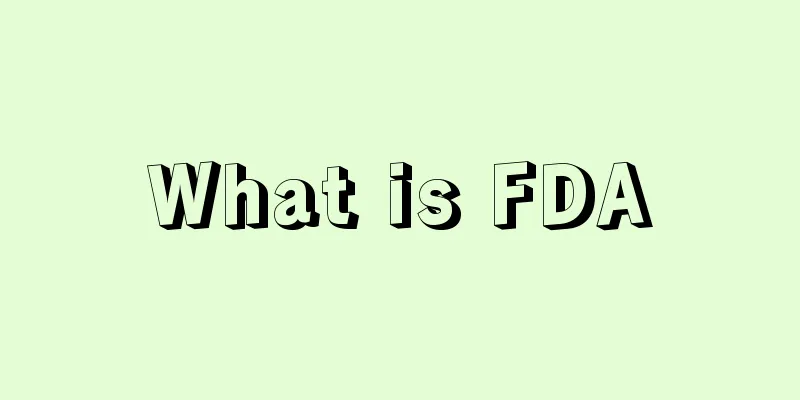What is FDA

|
The U.S. Food and Drug Administration (FDA) is affiliated with the U.S. Department of Health, Education and Welfare, and is responsible for the management of national drugs, food, biological products, cosmetics, veterinary drugs, medical devices, and diagnostic supplies.
FDA certification classification 1. FDA testing of food contact materials; 2. FDA registration of laser products; 3. FDA registration of medical devices; 4. FDA test reports of cosmetics and daily necessities; 5. FDA registration of food, drugs, cosmetics and daily necessities.
significance The FDA International Free Sales License is not only the highest level of certification among the US FDA certifications, but also the highest level of certification for food and drugs approved by the World Trade Organization (WTO). It is the only certification that must be fully approved by the US FDA and the World Trade Organization before it can be issued. Once this certification is obtained, the product can enter any WTO member country smoothly, and even the marketing model cannot be interfered by the government of the country where it is located.
Renewal The FDA renewal period is from October 1st to December 31st of each year. Companies must pay an annual fee in US dollars during this period to maintain the validity of FDA registration. If the renewal fee is not paid in time, the company will be deregistered by the FDA and will be disqualified from entering the US market.
Does Amazon need FDA certification or registration? This is mainly determined by the seller's products. When listing food contact materials (tableware, water cups, baby bottles, etc.), cosmetics, medicines, health products and other product categories on Amazon US, you generally need to provide an FDA test report. You can find a third-party testing agency approved by Amazon to make the relevant report. If you register with the FDA, companies that export food, drugs, and medical devices to the United States must register with the FDA and list their companies and products, otherwise customs will not clear them. Therefore, like the EU's CE certification, it is a mandatory requirement.
Common products on Amazon that require FDA registration 1. Food FDA registration According to the requirements of the Modern Food Safety Act of the United States, the owners, operators or responsible agents of domestic or foreign facilities that produce/process, pack or store human food or animal feed consumed in the United States, or individuals authorized by them, must register their facilities with the FDA. The types of products for human consumption include alcohol, flour and sugar products, beverages, candy, cereals, cheese, chocolate or cocoa, coffee or tea, food coloring, regular diet or three meal replacements including medicinal foods, functional foods (including Chinese herbal medicines), condiments, aquatic products, food additives, sweeteners, fruits and their products, gels, ice cream, imitation dairy products, pasta, meat, milk, broth or jam, nuts, eggs, vegetables and their products, vegetable oil, simulated meat, flour or starch, etc. Animal foods include: cereals, oilseeds, alfalfa, amino acids, animal products, brewing products, preservatives, citrus products, distilled products, enzymes, oils, fermented products, aquatic products, dairy products, minerals, molasses, non-protein nitrogen products, peanut products, animal waste recycling products, screenings, vitamins, yeast, pet food, etc. These food companies must submit registrations to the U.S. FDA to obtain a FFRN (Food Facility Registration Number) and PIN. When a food company submits a registration to the U.S. FDA, it must designate a person living in the U.S. as its U.S. agent. At the same time, every two years, between 12:01 a.m. on October 1 and 11:59 p.m. on December 31 of an even-numbered year, the original FDA registration number must be renewed, otherwise the original registration number will become invalid. Low-acid canned and acidified foods must register with the FDA to obtain the FFRN number and PIN, and must also file a processing declaration to obtain a Submission Identifier (SID number). In addition to registering with the FDA to obtain the FFRN number and PIN, health food products also need to make functional claims. Companies need to submit functional claims to the FDA for review and filing within 30 days after the product is launched. Egg farms, according to the regulations 21 CFR 118.1 (a), have more than 3,000 hens, and the eggs are not sold directly to consumers. Egg farms must register with the FDA. The company must first register with the FDA for food facilities as required by ordinary food companies, in addition to the FFRN number and PIN, and then obtain the Shell Egg Producer Registration number. When food is listed on the Amazon platform, it will be required to provide these registration numbers. 2. Cosmetics According to the US FDA cosmetic regulations, cosmetic registration is a voluntary requirement. Cosmetics companies can register cosmetics through the electronic system VCRP or submit paper documents before or after the product is launched in the United States. After registration, the company will have a company registration number and a product formula number (CPIS). The information that the company needs to provide includes company information (such as name, address, person in charge, contact information, etc.) and product information (such as trademark, formula, raw material CAS number, etc.). When cosmetics are listed on the Amazon platform, they will be required to provide these registration numbers. 3. Medical devices The U.S. FDA classifies medical devices into three levels: Class I, Class II, and Class III according to their risk levels. Class III has the highest risk level. Most Class III products must apply for PMA before they can be put on the market. The products must undergo clinical trials. After the products obtain the PMA number, they must register the company and list the products. After obtaining the registration number, they can be put on the market. Class II products are medium-risk products. Most Class II products must apply for FDA 510K before they can be put on the market. After obtaining the 510K number, they must register the company and list the products. After obtaining the registration number, they can be put on the market. Class l products are low-risk products. Most Class I products are 510K exempt products. As long as the company registers and lists the products with the FDA and obtains the registration number, the product can be put on the market. In the U.S. FDA's definition of medical devices, medical devices have a very broad scope, including large, medium and small instruments and equipment used in hospitals, such as MRI, CT machines, B-ultrasound, monitors, hospital beds, scalpels, etc., home blood pressure monitors, thermometers, wheelchairs, etc., and even products that are considered ordinary consumer goods in other countries, such as toothbrushes, glasses, diapers, sanitary napkins, etc. When these products are listed on the Amazon platform, they will be required to provide a registration number.
FDA Certification FAQ Q: Which agency issues the FDA certificate? A: There is no certificate for FDA registration. After the product is registered with the FDA, it will obtain a registration number. The FDA will give the applicant a reply letter (with the signature of the FDA Chief Executive), but there is no such thing as an FDA certificate. Q: Does FDA require a designated certified laboratory for testing? A: FDA is an enforcement agency, not a service agency. If someone says that they are a certification laboratory under FDA, then at least they are misleading consumers, because FDA has neither service certification agencies and laboratories for the public, nor so-called "designated laboratories". As a federal enforcement agency, FDA cannot engage in such a thing as being both a referee and a player. FDA will only recognize the GMP quality of service testing laboratories and issue certificates of compliance to qualified ones, but will not "designate" or recommend a specific one or several to the public. Q: Is a U.S. agent required for FDA registration? A: Yes. Chinese applicants must appoint a U.S. citizen (company/association) as their agent when registering with the FDA. The agent is responsible for performing process services in the United States and serves as the medium for contact between the FDA and the applicant. |
<<: What is Overseas Warehouse
Recommend
Loss of 3 million overnight! The factory faces many difficulties in transforming to become Amazon
A foreign trade factory owner who owns 8 properti...
What is Huafuda? Huafuda Review, Features
Huafuda Information Technology Co., Ltd. is the wo...
China Center for International Economic Exchanges releases report: Alibaba International Station becomes the new mainstream form of digital foreign trade
On March 3 , the China Center for International E...
What is takstarmall? takstarmall Review, Features
Founded in 1995, takstarmall is a leading manufact...
Europe's largest e-commerce retailers call on EU to simplify VAT rules
Recently, Ecommerce Europe and EuroCommerce, the ...
Imports are increasing instead of decreasing! U.S. port capacity is close to limit
Since the beginning of this year, there have been...
Even though they can earn twice as much working alone, sellers still want to flee Shenzhen
"Do you have any city recommendations? I wan...
Peak season is coming, how much do you know about Malaysian consumer habits?
Southeast Asia has a vast e-commerce market. Rely...
Amazon US Q3 Top 25 Beauty and Personal Care Products are out!
Amazon US Q3 Top 25 Beauty and Personal Care Prod...
What is Blue Nile? Blue Nile Review, Features
Founded in 1999, Blue Nile was founded on the beli...
The U.S. school sporting goods market is booming, with the highest growth rate exceeding 90%
Recently, Matt Powell, a sports industry consulta...
What is OKEBA? OKEBA Review, Features
AOKBA (Shenzhen AOKBA Technology Co., Ltd.) was e...
Cainiao and Hong Kong Airlines have reached a cooperation agreement to achieve the fastest delivery of Southeast Asian packages in 3 days
Alibaba is one step closer to achieving its famou...
Innovative digital flexible supply chain "SHEIN model" for digital transformation of traditional industries
With the development of Internet infrastructure a...
Japan ranks 9th in the world in terms of Covid resilience, and its “difficult” road to fighting the epidemic
According to recent statistics released by Bloomb...









